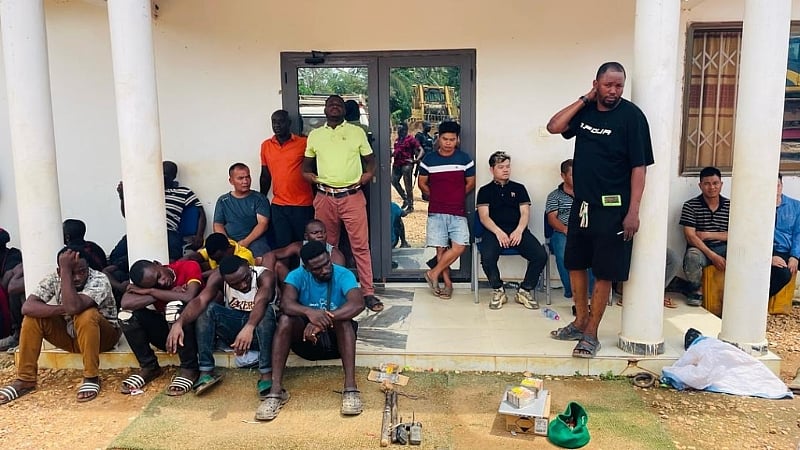Paragraph 1: The Raid and Arrests
In a decisive move against illegal mining activities, Ghanaian police forces conducted a targeted operation in a forest reserve near Samreboi, Western Region. The operation resulted in the apprehension of 26 individuals suspected of engaging in illicit mining, locally known as "galamsey." The arrested individuals included six Chinese nationals, two Koreans, and eighteen Ghanaians. Law enforcement agencies involved in the raid included the Intelligence Directorate, the Criminal Investigations Department (CID), the National Operations Directorate, and the Formed Police Unit, demonstrating a coordinated effort to combat this environmentally destructive practice. The operation, based on intelligence gathered, reflects the intensified commitment of Ghanaian authorities to curb the devastating effects of galamsey on the nation’s natural resources and ecosystems.
Paragraph 2: Confiscated Equipment and Vehicles
The police operation not only led to the arrest of individuals but also the seizure of significant mining equipment and vehicles used in the illegal operation. Eight excavators, crucial machinery for extracting minerals, were successfully confiscated from the site. However, logistical challenges prevented the removal of five additional excavators found at the location. The seized vehicles included two Toyota Hilux pickup trucks, a Toyota RAV4, and four motorbikes, likely used for transporting personnel and materials within the mining area. Various other mining tools and equipment were also recovered, providing further evidence of the scale and organization of the illegal mining activity.
Paragraph 3: Linking the Operation to Akonta Mining and Chairman Wontumi
Investigations into the illegal mining operation have linked the site to Akonta Mining Company, a firm owned by Bernard Antwi Boasiako, widely known as Chairman Wontumi. Chairman Wontumi’s name has previously emerged in connection with illegal mining activities within Ghana, raising concerns about his potential involvement in environmental degradation. The connection between the Samreboi mining site and Akonta Mining has brought increased scrutiny to the company’s operations and its potential role in contributing to the pervasive problem of galamsey across the country. This link underscores the complex web of individuals and entities potentially implicated in illegal mining.
Paragraph 4: Discovered Weapons and Environmental Devastation
The police raid uncovered not only mining equipment but also a cache of weapons at the illegal mining site. The discovery of pump-action guns raises concerns about potential security threats associated with galamsey operations. The presence of such weapons suggests a level of organization and potential for violence related to the illegal activity. Beyond the security implications, the environmental damage inflicted by the illegal mining operation was readily apparent. Extensive tracts of land had been devastated, and vital water bodies were polluted due to the mining activities, highlighting the severe ecological consequences of galamsey. The destruction inflicted on the environment further emphasizes the urgency of combating these illegal practices.
Paragraph 5: Legal Proceedings and the Fight Against Galamsey
The 26 individuals arrested in the Samreboi raid remain in police custody and are expected to face legal proceedings in the near future. The prosecution of these individuals will serve as a deterrent and demonstrate the government’s commitment to holding perpetrators of illegal mining accountable for their actions. The Inspector General of Police, Christian Tetteh Yohuno, has reaffirmed the police force’s dedication to eradicating illegal mining in Ghana. This commitment extends beyond individual arrests to addressing the systemic factors that contribute to galamsey, including corruption, lack of alternative employment opportunities, and weak environmental regulations.
Paragraph 6: The Broader Context of Illegal Mining in Ghana
The Samreboi raid represents a single, albeit significant, action within a broader national effort to combat illegal mining in Ghana. Galamsey poses a multifaceted challenge, impacting not only the environment but also social structures, economic stability, and public health. The destruction of forests, pollution of water sources, and degradation of agricultural lands have far-reaching consequences for communities and ecosystems. Further compounding the issue is the use of mercury in the gold extraction process, leading to mercury poisoning and long-term health problems. The Ghanaian government, along with civil society organizations and international partners, are working to implement comprehensive strategies to address the root causes of galamsey, promote sustainable livelihoods, and strengthen environmental protection measures. This includes enhancing law enforcement capacity, promoting community-based monitoring, and raising public awareness about the devastating impacts of illegal mining.














